
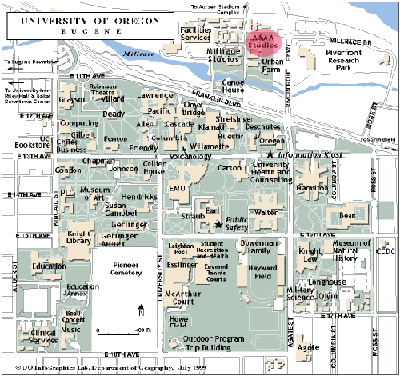 |
|
| The forming room is inside the
metal smithing building which is a member of the
Millrace complex. The main activity the room
supports is metal forming, which is the pounding
of soft metals (usually in sheet form) by hammer
on anvil into some raised form. It is also used
for grinding of metals and sandblasting, two
other activities that similarly produce
noticeable heat gains and substantial levels of
noise. The room is eight feet by eleven, and
always sealed off when in use so as to contain
the sound. There can be as many as five or six
people using this space at peak demand, although
two is more common. |
|
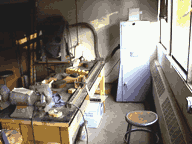 |
The room is south facing, with
that side glazed it's full length. Of the four 2'
x 4' singly pane windows, only one is partially
operable, and that one is largely blocked by
equipment. Another window had a substantial
portion poorly boarded up with plywood, and is
likely a spot where a ventilator one sat. The
ceiling section is made up of a layer of
1/4" sound dampening board backed by a small
air space, plywood and the actual roofing
shingles, so there is little insulation on that
side either. |
| The room has a heater which is no
longer used, and a single vent at the bottom of
the door between it and the main room on which
it's attached. |
|
| The main room is much larger, and
thoroughly ventilated because of the use of gas
torches and chemical soldering. It has a working
heating / cooling system, although users have
said that it is not always the best performing. The building, including the forming room, is open all day, and generally well into the night as well. Sometimes, when in heavy use, it can go over a week without closing. |
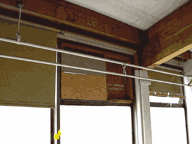 |
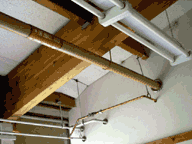 |
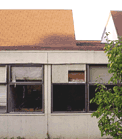 left:
view of ceiling and lack of insulation left:
view of ceiling and lack of insulation right: view from outside, notice wood panel in center window |
Inquiry Questions: How do heat gains from human activity and pounding of metal affect thermal comfort? Is any draft created by gaps in boarded up window? Do any objects in the room (work table, metal hammers) have a high thermal mass, and if so how could they be arranged to increase/decrease heat gains? Does the lack of shading on south facing windows result in unwanted temperature rise?
Hypothesis: Because the forming room is dependent on a large amount of heat gains from solar radiation to provide adequate thermal comfort, the room will not provide enough heat for the users during the overcast winter of Eugene.
|
|
|